★★
“Do we really need a ghetto, microbudget version of Charlie’s Angels? But then, did we really need the TV reboot?”
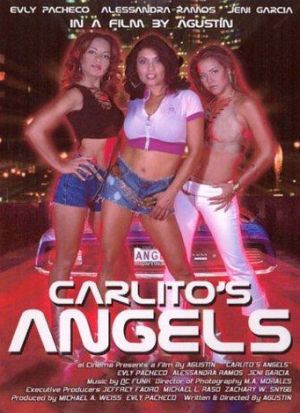 In many ways, this is wretched beyond belief, crippled by near non-existent production values and likely only to appeal to those who live in the urban culture depicted. And yet… For every moment of wince-inducing idiocy [Agustin appears to be a big fan of Benny Hill, using speeded-up footage for “humourous” effect more than once], there were moments of surreal charm. For instance, “Captions for the Hispanic-impaired,” or the really terrible fight scene which breaks the fourth wall, turning into a “making of” segment which (and I can attest to this) accurately depicts the hell of being a microbudget moviemaker. Or that the large family of children belonging to one of the Angels includes a bearded midget. “He just showed up one day. Hey, he buys groceries, it’s cool” is her casual explanation.
In many ways, this is wretched beyond belief, crippled by near non-existent production values and likely only to appeal to those who live in the urban culture depicted. And yet… For every moment of wince-inducing idiocy [Agustin appears to be a big fan of Benny Hill, using speeded-up footage for “humourous” effect more than once], there were moments of surreal charm. For instance, “Captions for the Hispanic-impaired,” or the really terrible fight scene which breaks the fourth wall, turning into a “making of” segment which (and I can attest to this) accurately depicts the hell of being a microbudget moviemaker. Or that the large family of children belonging to one of the Angels includes a bearded midget. “He just showed up one day. Hey, he buys groceries, it’s cool” is her casual explanation.
As you’d expect, it’s a spoof, with the three leading ladies living in Harlem, and as in the original, getting their orders from Charlie by phone – except, here, that’s because he’s locked up in jail. While sent undercover at a strip-club, supposedly to track down some white girl whose sleeping with a local guy, they overhear their landlord Big Lou (Reynosa) getting a loan from the Mafia guy who owns the club. He promises to pay the loan back by fixing the “boleta,” the local numbers game. They’re not going to tolerate this attack on an integral part of their culture, so have to stop him and his associate, Triple Gauge, before they can bring this heinous plot to completion.
Credit the three leads for giving their all, attacking their characters with a great deal of energy, that helps overcome some of the obvious limitations. I’m pretty sure a lot of cultural references went whizzing way above my head, but as the kids say, I’m “down” enough [Phoenix is pretty Hispanic] to be able to get a good chunk. The plot is pretty awful, the action falls short of even the 1970’s original version, and there’s way too much yapping, of a style generally seen on afternoon talk-shows. But there’s a sense the people involved have genuine enthusiasm, and made it for the love of film-making. At barely an hour between (rather nifty) comic-book styled opening credits and (entirely unfunny) bloopers which close things out, it can hardly be accused of overstaying its welcome. I probably enjoyed it more than the grade above suggests, but I own the very substantial tolerance for poverty-row productions required; your reaction will likely depend on that.
Dir: Agustin
Star: Evly Pacheco, Alessandra Ramos, Jeni Garcia, Raymond Reynosa





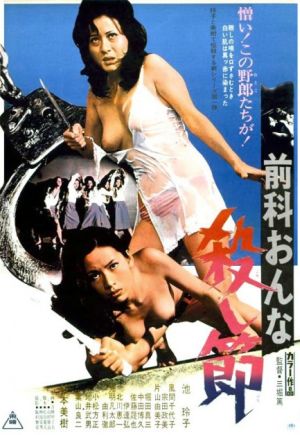 With a bit more of an intricate plot than most entries, this is the tale of revenge served cold. The Oba Yakuza gang shoot one of their flunkies up with drugs and dump his dead body in a ditch. His daughter, Maki (Ike), tries to stab the boss responsible (Hayama) in a nightclub, but she is, frankly, a bit crap with a blade; the attack fails, and she ends up in prison. There, after proving her toughness in a jail “I quit” match, she is accepted by the other girls, including the heavily-tattooed Masayo (Sugimoto). A few years pass, and Maki gets out of jail; her friends are waiting, and they agree to help in her plan for vengeance. This involves Tetsu, the psycho scion of the Hamayasu clan, who used to rule things before the Oba group came in and kicked their asses. Maki will use him as the scapegoat, to trigger war between the groups, then step in to take out Oba once he has been weakened. That’s the plan, anyway, with Maki whoring herself out, to (gasp!) foreigners and even (shock!) a black airman to get resources. However, a large spanner in the works is that Masayo is also Oba’s wife…
With a bit more of an intricate plot than most entries, this is the tale of revenge served cold. The Oba Yakuza gang shoot one of their flunkies up with drugs and dump his dead body in a ditch. His daughter, Maki (Ike), tries to stab the boss responsible (Hayama) in a nightclub, but she is, frankly, a bit crap with a blade; the attack fails, and she ends up in prison. There, after proving her toughness in a jail “I quit” match, she is accepted by the other girls, including the heavily-tattooed Masayo (Sugimoto). A few years pass, and Maki gets out of jail; her friends are waiting, and they agree to help in her plan for vengeance. This involves Tetsu, the psycho scion of the Hamayasu clan, who used to rule things before the Oba group came in and kicked their asses. Maki will use him as the scapegoat, to trigger war between the groups, then step in to take out Oba once he has been weakened. That’s the plan, anyway, with Maki whoring herself out, to (gasp!) foreigners and even (shock!) a black airman to get resources. However, a large spanner in the works is that Masayo is also Oba’s wife…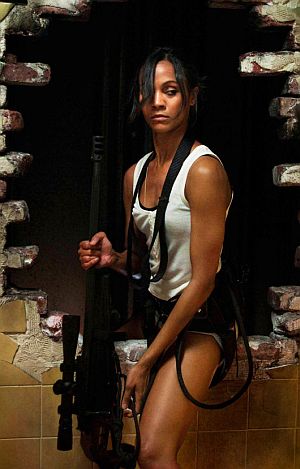 There are moments where this seems to have the potential to break out beyond its story, but once you get past the strong central core, the script has very little to offer. Cataleya (Saldana) narrowly escapes death when her parents are killed on the orders of their gangster employer, Don Luis. She flees from Colombia to Chicago and is raised by a family friend, but never forgets where she came from, and has revenge on her mind. Grown-up, she becomes a hit-woman, but has a side-project of payback. She has an occasional boyfriend (Vartan) who knows little about her, and a dogged FBI agent (James), intent on tracking down the mysterious, elusive killer. Y’know: all the usual baggage that goes along with being an assassin.
There are moments where this seems to have the potential to break out beyond its story, but once you get past the strong central core, the script has very little to offer. Cataleya (Saldana) narrowly escapes death when her parents are killed on the orders of their gangster employer, Don Luis. She flees from Colombia to Chicago and is raised by a family friend, but never forgets where she came from, and has revenge on her mind. Grown-up, she becomes a hit-woman, but has a side-project of payback. She has an occasional boyfriend (Vartan) who knows little about her, and a dogged FBI agent (James), intent on tracking down the mysterious, elusive killer. Y’know: all the usual baggage that goes along with being an assassin.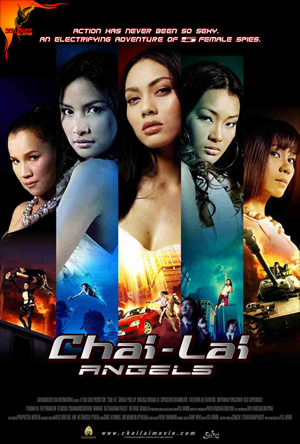 66% extra free! That’s the major difference here, as five, rather than three, little girls, who get their orders from an unseen “boss” and his faux Bosley, take on a variety of disguises and kick butt, in between romantic dalliances. Of course, with a budget approximately one-eightieth of the Hollywood version, certain economies have to be expected. But there are unexpected bonuses in the lunatic invention department, such as the when the villainous henchmen drops a cage, out of nowhere, onto four of our Angels, only for the fifth to come to their rescue, for no apparent reason either, in a
66% extra free! That’s the major difference here, as five, rather than three, little girls, who get their orders from an unseen “boss” and his faux Bosley, take on a variety of disguises and kick butt, in between romantic dalliances. Of course, with a budget approximately one-eightieth of the Hollywood version, certain economies have to be expected. But there are unexpected bonuses in the lunatic invention department, such as the when the villainous henchmen drops a cage, out of nowhere, onto four of our Angels, only for the fifth to come to their rescue, for no apparent reason either, in a 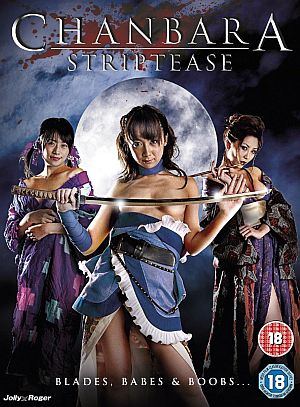 Lili is a devotee of Sayama Hashinryu, a deadly form of swordsmanship passed down from woman to woman. She goes through the initiation rite, which involves being blindfolded and given a drink which knocks her unconscious. She comes to, about three hundred years in the past, in feudal Japan, naked. When she gathers her senses, she rescues a local village-girl from some ninjas, but to cut a long story short, discovers in the process that when Lili exposes her breasts, they emit a pinkish glow, and she becomes far better at swordplay. Turns out the poor villagers are suffering extortion from the evil Lady Okini (Asa), so Lili turns into the Magnificent One [or Magnificent Two, if you know what I mean, and I think you do], while also falling for Hikoichi (Matsuda), the brother of the girl she rescued. However, it turns out that Lili is not the only one in possession of a supernatural bosom; Lady Okini is also so equipped. Battle cleavages are thus drawn…
Lili is a devotee of Sayama Hashinryu, a deadly form of swordsmanship passed down from woman to woman. She goes through the initiation rite, which involves being blindfolded and given a drink which knocks her unconscious. She comes to, about three hundred years in the past, in feudal Japan, naked. When she gathers her senses, she rescues a local village-girl from some ninjas, but to cut a long story short, discovers in the process that when Lili exposes her breasts, they emit a pinkish glow, and she becomes far better at swordplay. Turns out the poor villagers are suffering extortion from the evil Lady Okini (Asa), so Lili turns into the Magnificent One [or Magnificent Two, if you know what I mean, and I think you do], while also falling for Hikoichi (Matsuda), the brother of the girl she rescued. However, it turns out that Lili is not the only one in possession of a supernatural bosom; Lady Okini is also so equipped. Battle cleavages are thus drawn… This feels more like a mid-season episode of Alias than anything else, and not much more than a filler episode at that. I say this, because so little effort is put into developing the characters, it’s as if the makers reckon everything had already been established in the previous seven installments. And since there
This feels more like a mid-season episode of Alias than anything else, and not much more than a filler episode at that. I say this, because so little effort is put into developing the characters, it’s as if the makers reckon everything had already been established in the previous seven installments. And since there  It’s nice to see Hong Kong making a decent action heroine film: that’s really where the genre started off, and it’s been responsible for some of the best entries in the field. That said, this doesn’t quite deserve to be placed on the same level, but star Jiang Lui Xia certainly has her potential – my immediate thought is to put her in the same film as Jeeja Yanin, and we might really have something. [Sidenote: Jiang got her big break as the result of a couple of unusual ways. Viral videos she posted on the Internet, which in turn got her a slot on a reality show called The Disciple in Hong Kong, produced by Jackie Chan. The winner – not her – got to star in a feature.] Much like her Thai colleague, Jiang is clearly a martial artist first, and actress…well, probably fifth or sixth, despite her resemblance to Shin Eun Kyung from My Wife is Gangster. She seems to have three expressions, used in strict rotation, and the plot is frankly implausible nonsense too.
It’s nice to see Hong Kong making a decent action heroine film: that’s really where the genre started off, and it’s been responsible for some of the best entries in the field. That said, this doesn’t quite deserve to be placed on the same level, but star Jiang Lui Xia certainly has her potential – my immediate thought is to put her in the same film as Jeeja Yanin, and we might really have something. [Sidenote: Jiang got her big break as the result of a couple of unusual ways. Viral videos she posted on the Internet, which in turn got her a slot on a reality show called The Disciple in Hong Kong, produced by Jackie Chan. The winner – not her – got to star in a feature.] Much like her Thai colleague, Jiang is clearly a martial artist first, and actress…well, probably fifth or sixth, despite her resemblance to Shin Eun Kyung from My Wife is Gangster. She seems to have three expressions, used in strict rotation, and the plot is frankly implausible nonsense too.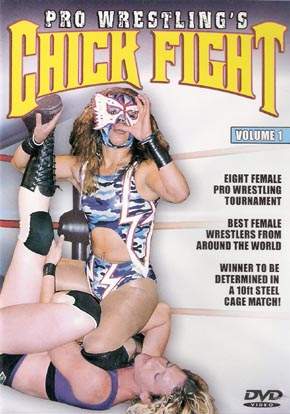 This 8-woman tournament took place on October 2004 as part of All Pro Wrestling’s Halloween Hell weekend, in in Hayward, California and.was the first under the ‘Chickfight’ banner. If you’re used to the Diva “matches” [quotes used advisedly] put on by the WWE, this will come as a pleasant surprise – it’s closer to the Japanese style, where technical skill is more important than breast implants. Perhaps the most surprising thing is the length of the bouts: rather than being a five-minute distraction, 15 or 20 minutes being not uncommon. The wrestlers come from Mexico and Japan as well as the US, though they really deserve better than both the location, which appears to be a lock-up garage complete with a roll-up door on one side, and the crowd, the bouts taking place in front of an audience that hardly seems to number fifty.
This 8-woman tournament took place on October 2004 as part of All Pro Wrestling’s Halloween Hell weekend, in in Hayward, California and.was the first under the ‘Chickfight’ banner. If you’re used to the Diva “matches” [quotes used advisedly] put on by the WWE, this will come as a pleasant surprise – it’s closer to the Japanese style, where technical skill is more important than breast implants. Perhaps the most surprising thing is the length of the bouts: rather than being a five-minute distraction, 15 or 20 minutes being not uncommon. The wrestlers come from Mexico and Japan as well as the US, though they really deserve better than both the location, which appears to be a lock-up garage complete with a roll-up door on one side, and the crowd, the bouts taking place in front of an audience that hardly seems to number fifty.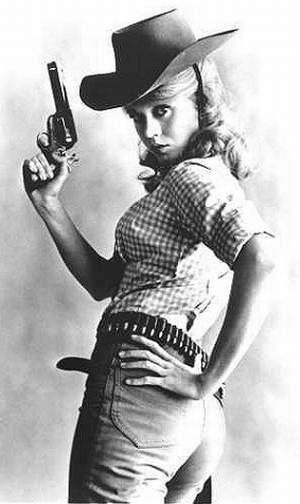 Aspiring teacher Catherine Ballou (Fonda), heads home to see her father in Wyoming, but finds him engaged in a struggle over his land with a land baron, and threatened by the villainous Tim Strawn (Marvin). She sends for legendary gun-fighter Kid Shelleen (also Marvin) to come protect them, only to find he is less legendary gun-fighter, and more alcoholic bum, incapable of saving himself. Strawn shoots Cat’s father and, when justice fails to be served, she heads off to a nearby outlaw town, where she vows to bring the land baron down and take revenge herself.
Aspiring teacher Catherine Ballou (Fonda), heads home to see her father in Wyoming, but finds him engaged in a struggle over his land with a land baron, and threatened by the villainous Tim Strawn (Marvin). She sends for legendary gun-fighter Kid Shelleen (also Marvin) to come protect them, only to find he is less legendary gun-fighter, and more alcoholic bum, incapable of saving himself. Strawn shoots Cat’s father and, when justice fails to be served, she heads off to a nearby outlaw town, where she vows to bring the land baron down and take revenge herself.

















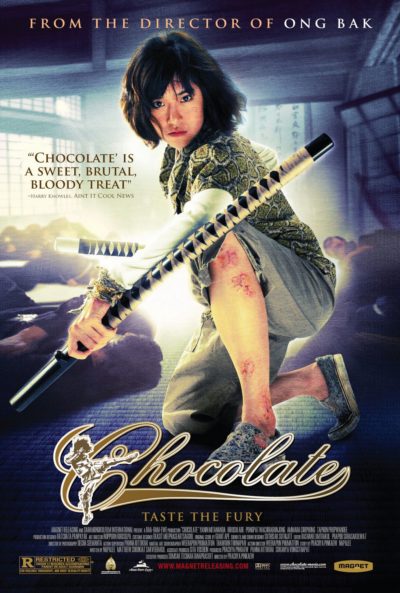 We couldn’t wait for this one to get an official American release, so off to Ebay we went for a copy of uncertain origin. This was something of a double-edged sword. It means we get to tell you that this is, hands down,
We couldn’t wait for this one to get an official American release, so off to Ebay we went for a copy of uncertain origin. This was something of a double-edged sword. It means we get to tell you that this is, hands down,